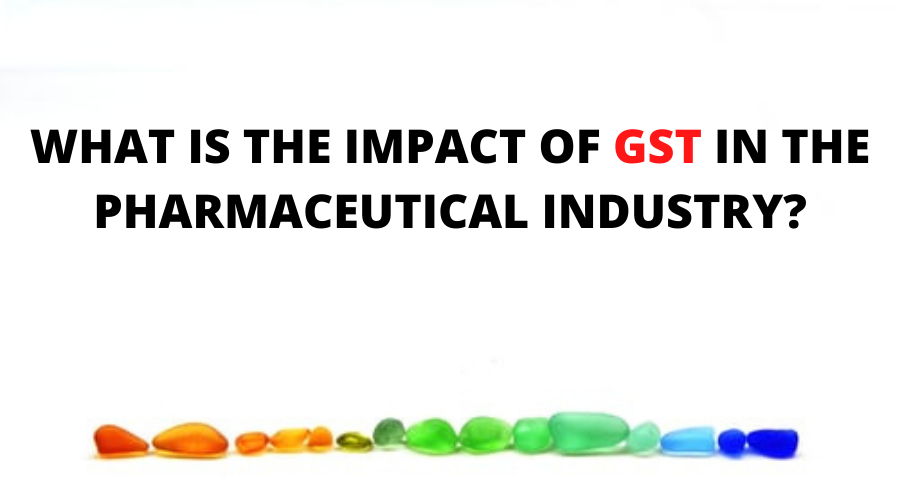What is GST?
The Goods and Services Tax (GST) is the largest tax reform in India laid down by the Indian Indirect Taxation industry. The industry also controls many other taxes like Service Tax, VAT, CST, Entertainment Tax, excise duty, Luxury Tax, and many more.
GST helps eliminate cost, time, and effort for the industries as it is a single taxation system in India
The GST has an impact on the Pharmaceutical industry. The sanctioning of the GST bill has benefited many industries in India, and the taxation part has become easy compared to the prevailing taxation system.
Impact of GST on India’s Pharmaceutical Industry
Earlier, the medicines paid 5% tax, and the pharmaceutical companies in India pay 12% GST on medicines. Items like discount offers, bonus schemes, free-drugs samples, and inter-state stock transfer of expired medicines are imposed with GST.
Now the pharma companies cannot enjoy area-based freedom with this new GST structure. It results in increased costs for the end-consumers.
The GST facility is said to fetch growth to the Pharma Franchise Business by having a proficient inventory network service and reducing the cost of assembling PCD pharma products The manufacturing costs were reduced after the implication of GST on the PCD Pharma company.
Now the Pharma companies will experience improved agreement systems and improved operational efficiency. The warehousing strategy will also enjoy the benefits from the GST. Initially, the companies organized their warehouses in different states to avoid the Central Sales tax of the States.
But now they have to plan their warehouses at the planned location, and they will have to pay Integrated GST only on the interstate transport of Goods & Services. So, the pharma sector has many advantages, it will reduce further complications and centralize multiple taxes into a single tax.
After the implication of GST, all the distribution channels have to acquire registration and file returns too. Earlier, this procedure was not required as they did not have to pay tax and file returns. It will reduce the non-issuance of invoices and increase conformity.
What Are the Major Concerns
There are major concerns of the PCD Pharma Companies about the implication of GST on Active Pharmaceutical Ingredients (APIs).
Life-saving drugs were exempted from the Excise and Customs Duties before the introduction of the HST. Different states charged different percentages of taxes, some charge 5% on the medicines. But GST changed the entire scenarios of the top pharma companies in India.
The major concern for the sector was the inverted duty structure negatively impacting the domestic manufacturers. The input cost of pharmaceutical bulk drugs was higher than the total output cost, i.e., the cost of raw materials was higher in terms of inverted duty in comparison to the finished products.
To address the alarming issue, the GST structure passed a law for the pharma franchise business for the inverted duty structure and the companies will be processed with a refund of the accumulated credit.
Hence, the introduction of GST proved to be beneficial for the PCD Pharma Companies and healthcare sector in India. And, will surely act as a proponent behind the growth and development of the healthcare industry in India.
Applicability of GST on Pharmaceuticals
GST is applied to the medical services provided by the doctors and also on the sales of medicines. The top pharma franchise companies in India are adhering to the below GST rules and regulations on medical services.
- GST on Hospitalisation
The medical supplies and pharma products used at the hospitalization time for an individual are charged at the NIL rate of GST.
- GST on Medical Services
The services provided (veterinary & other health services) by hospitals, licensed clinics, and doctors are charged the NIL rate of GST.
- GST on Expired Medicines
The All India Organisation of Chemists & Druggists Association (AIOCD) symbolizes the Indian Pharmaceutical Market and represents nine lakhs chemists in India. The AIOCD requested the GST Council to pass a clear policy for damaged, non-resalable drugs and expired medicines, in terms of GST.
If the medicines are expiring and not saleable, return them to the manufacturer with the help of the supply chain. The wholesaler or the retailer has two options:
-
- Issuance of a credit note for the returned medicines
- Consider the returned expiry goods as the fresh supply
- GST on Sales of Medicines
There are four attractive GST tax rates on the sale of medicines- NIL, 5%, 12% & 18%.
The Bottom Line
The Indian Pharma Market is positive and confident with the GST rules. Both the industry and customers will share the advantages. The healthcare industry including the pharma distributors will enjoy benefits and profitability after the implementation of GST in the Pharmaceutical Industry. As a result, the sector will be enjoying a better future.
Tesni Pharmaceuticals, the top PCD Pharma company in Ahmedabad is also positive and hopeful for having a healthy and profitable future in the coming years. If you are thinking of having a profitable business, you can own a Pharma franchise.
Visit www.tesnipharma.in and call on the mentioned contact details of Tesni Pharma.

